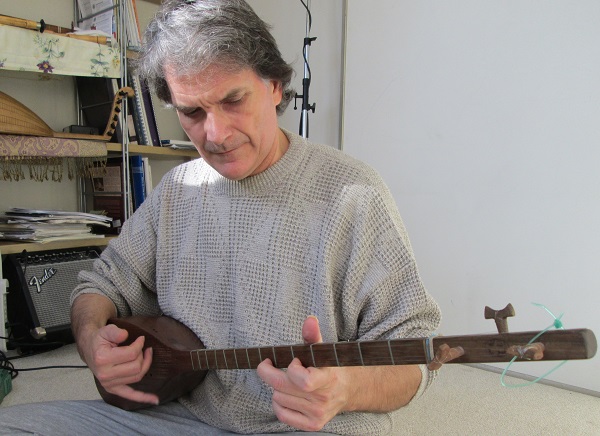York University music professor to perform Middle Eastern music at Casa del Popolo
A music professor from York University, Rob Simms will be performing a benefit show in Montreal to raise awareness for Mosul refugee relief on June 20 at Casa del Popolo at 8:30 p.m. It will be a free show, though people can donate money to the United Nations Refugee Agency in Canada (UNHCR) to help refugees from Mosul, Iraq. Simms will be performing a combination of solo improvisations and traditional Iraqi, Kurdish and Turkish songs.
Simms has been teaching in the music department of York University in Toronto since 2000. He is an ethnomusicologist—meaning he studies music in a cultural context—and also a multi-instrumentalist, specializing in traditional Middle Eastern and West African music. His passion for Middle Eastern music developed from his love of Spanish flamenco music. “I followed my passion of being a listener,” he said. “I got very deep into flamenco, and I started exploring the roots of flamenco—it took me to Arab music,” he said.
Simms said playing Middle Eastern music became even more enjoyable than listening to it because it allowed him to meet other passionate people and expand his knowledge of the music. “You start poking around, and you find more things that are more to your taste. There is an introduction, and then you find exactly what turns you on musically,” he said. “It’s a fantastic thing—it’s cultural, intellectual and pleasurable.” Over the years, Simms has learned to play the oud (a short-necked lute), the setar (a long-necked lute), the tanbur (a string instrument), the kora (a harp) and various percussion instruments.
Even though there are political differences between Middle Eastern countries, Simms said their music shares similarities. “The music is all related and complementary,” he said. “As soon as you put borders, it creates conflict—but when you listen to the music from these countries, they all fit together nicely.” According to Simms, when you bring these cultures together, musically and spiritually, they are like one big family. “I look at it as a family reunion. Of course there was a lot of agitation and colonization, but it’s a reminder of the connection as opposed of the division,” he said.
As he explored Middle Eastern music, Simms said he realized there had been great cultural loss in Iraq due to all the political conflict. “Many aspects of their culture have been destroyed in the last couple of decades due to the political turmoil,” he said. “It’s chaos there—the music has been lost.” According to Simms, this disruption of Iraqi culture significantly lessened the amount of available information about Middle Eastern music—and it’s what led him to write a book about the music. He has also written two books on Persian classical music. “Even though I am not the best person to write about Iraqi music, I did so to satisfy my own questions about it,” he said. “Then I realized that this music needs advocacy—it needs people to keep interest in this music.”
In 2003, Simms published The Repertoire of Iraqi Maqam, a book about the classical music of Iraq, known as Iraqi maqam. According to Simms, the word maqam also refers to your state of consciousness. “Maqam creates an atmosphere and hopefully it elevates people. Surely, as I play the music, it elevates me—you go deeper and deeper, and get into higher degrees of spiritual realization,” he said.
Simms will be performing classical Iraqi maqam at the benefit performance. He will be playing the oud, the Kurdish tanbur and the ney, a Turkish flute. According to Simms, Iraqi maqam sounds more like chamber music than concert music. “The music is heavy and slow—it’s ritual music used for meditation. It’s music that makes you go inside of yourself,” he said. He hopes his performance will allow people to reflect on the tragedies Iraqis have faced.
During the show, photographs depicting the realities of life in Mosul, Iraq and the experiences of its refugees will be projected behind the stage. According to the UNHCR, the fighting in Mosul started in October 2016, leaving 400,000 people trapped in Mosul refugee camps that lack clean water, food, support, shelter and fuel to generate heat.
“We need to have compassion for human beings. Forget about nationalities or religion, we have people suffering,” Simms said. “We need to remind people about the situation there. It’s not just about raising money, it’s about raising awareness.”




